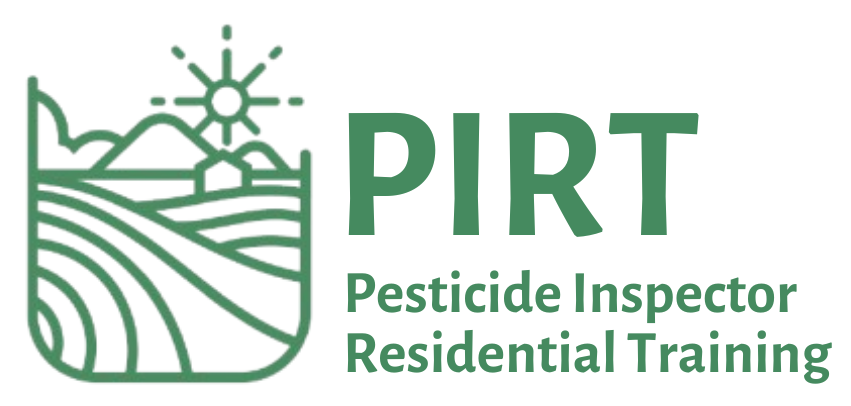

The Pesticide Inspector Residential Training program provides national pesticide educational training to inspectors and enforcement staff of pesticide state lead agencies, territories and tribes working under Federal Insecticide, Fungicide and Rodenticide Act cooperative agreements. PIRT’s goal is to develop or enhance pesticide enforcement staff’s ability to formulate and implement pesticide regulatory programs and undertake new initiatives. Our programs support staff by delivering a foundational understanding of FIFRA’s basic inspector concepts and activities, while enhancing their ability to conduct different types of inspections and develop strategies to address ongoing challenges through tackling complex and highly nuanced issues surrounding implementation of new federal registrations, rulemaking and priorities.
PIRT uses classroom instruction and field trips, including mock inspections, to teach demonstrated approaches to conducting investigations. PIRT will promote uniformity in enforcement approaches and understanding while considering differing needs based on geography and varying state or tribal regulations.
2025-2026 PIRT Steering Committee Members
State Lead Agencies
Tony Cofer, Alabama Department of Agriculture
Michael Ekedahl, Wisconsin Department of Agriculture, Trade, and Consumer Protection
Michael Rigirozzi, Colorado Department of Agriculture, Division of Plant Industry
Matt Wood, Vermont Agency of Agriculture, Food and Markets
Garret Creason, Office of Indiana State Chemist
Patrick Jones, North Carolina Department of Agriculture and Consumer Services
Africa Dorame-Avalos, Inter Tribal Council of Arizona, Inc.
Association of Structural Pest Control Regulatory Officials
Allison Cuellar, Texas Department of Agriculture
Association of American Pesticide Control Officials
Bob Blankenburg, Alaska Department of Environmental Conservation
U.S. Environmental Protection Agency
Sharon Dobesh, EPA Region 7
Ricardo Jones, EPA OECA, Office of Compliance
Royan Teter, EPA OECA, Office of Civil Enforcement
Cindy Wire, EPA PREP Liaison
About PIRT
Enforcement and compliance assistance programs work to ensure that human health and the environment are adequately protected. They also provide structure that strengthens the pesticide applicator community and industry interests and serve as an important element in garnering the public’s faith in our government’s ability to address issues related to pesticide use. Pesticide enforcement field staff are the front line in regulating pesticide use and integral in supporting EPA’s goals.
PIRT is a collaboration between the National Association of State Departments of Agriculture Foundation, the EPA, and subject matter experts that provides high-quality, relevant training for State Lead Agency, the Tribal Pesticide Enforcement Program, and Territorial Lead Agency inspectors. Offering three to four in-person courses a year, training focuses on fundamentals as well as a wide variety of topic-specific and advanced content to engage varying levels of experience among enforcement staff. Courses are hosted across the U.S., typically over four days, and include classroom instruction, field trips and mock inspections. Training is provided by leading subject matter experts, with topics informed by input from our steering committee.
PIRT seeks to strengthen and expand networks for inspectors and build collaborative relationships, providing opportunities for staff to engage in ongoing learning, the sharing of resources and a platform to discuss current issues they face while developing effective strategies for fostering compliance among the regulated community.
Participation
PIRT solicits nominations from pesticide state lead agencies for enforcement staff to attend the courses several months in advance of the course. Instructions for submissions will be included in the course announcements.
Questions
If you have any questions regarding PIRT or would like further information about the program, please contact Amy Sullivan at amy.sullivan@nasda.org or Cary Giguere at cary.giguere@nasda.org.
PIRT is funded by a cooperative agreement with the U.S. Environmental Protection Agency’s Office of Enforcement and Compliance Assurance.








